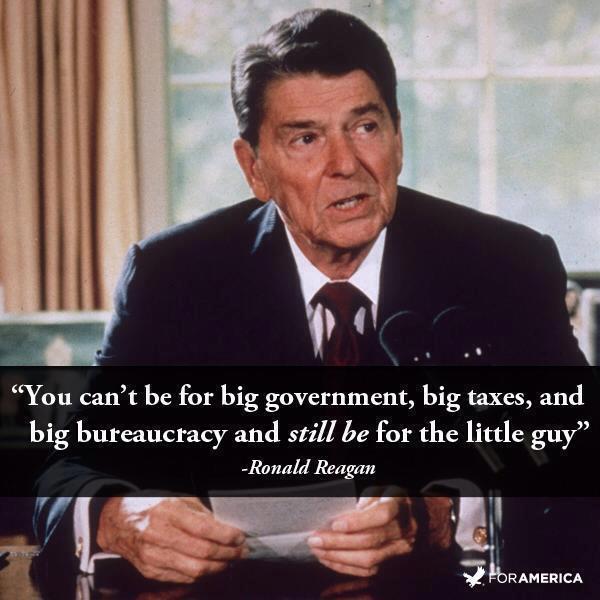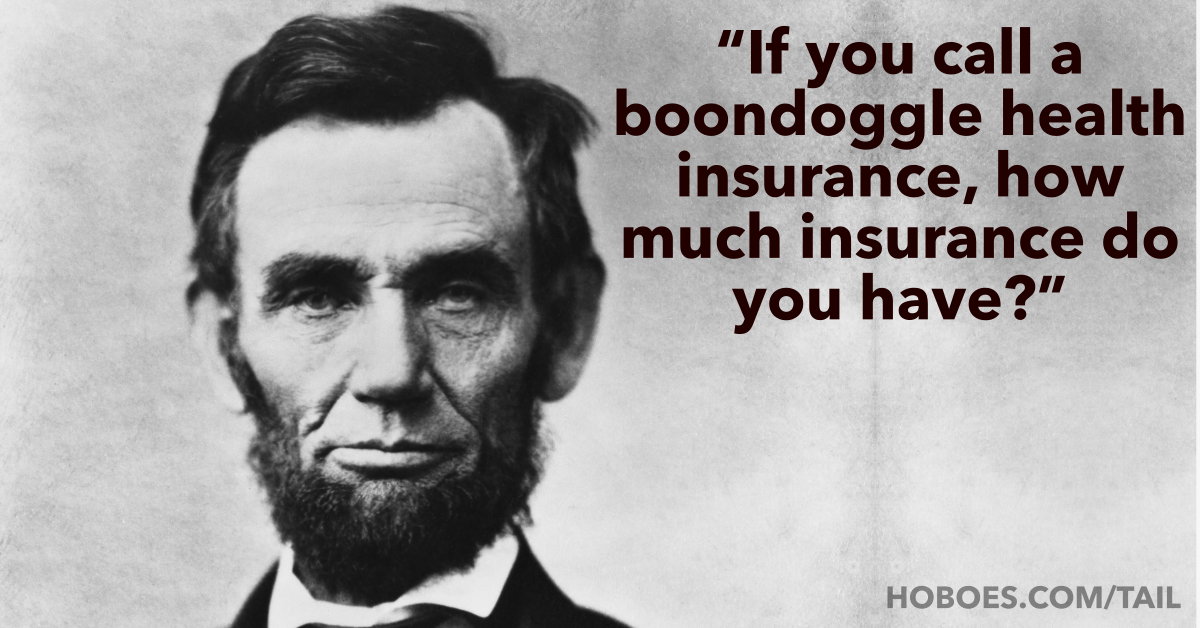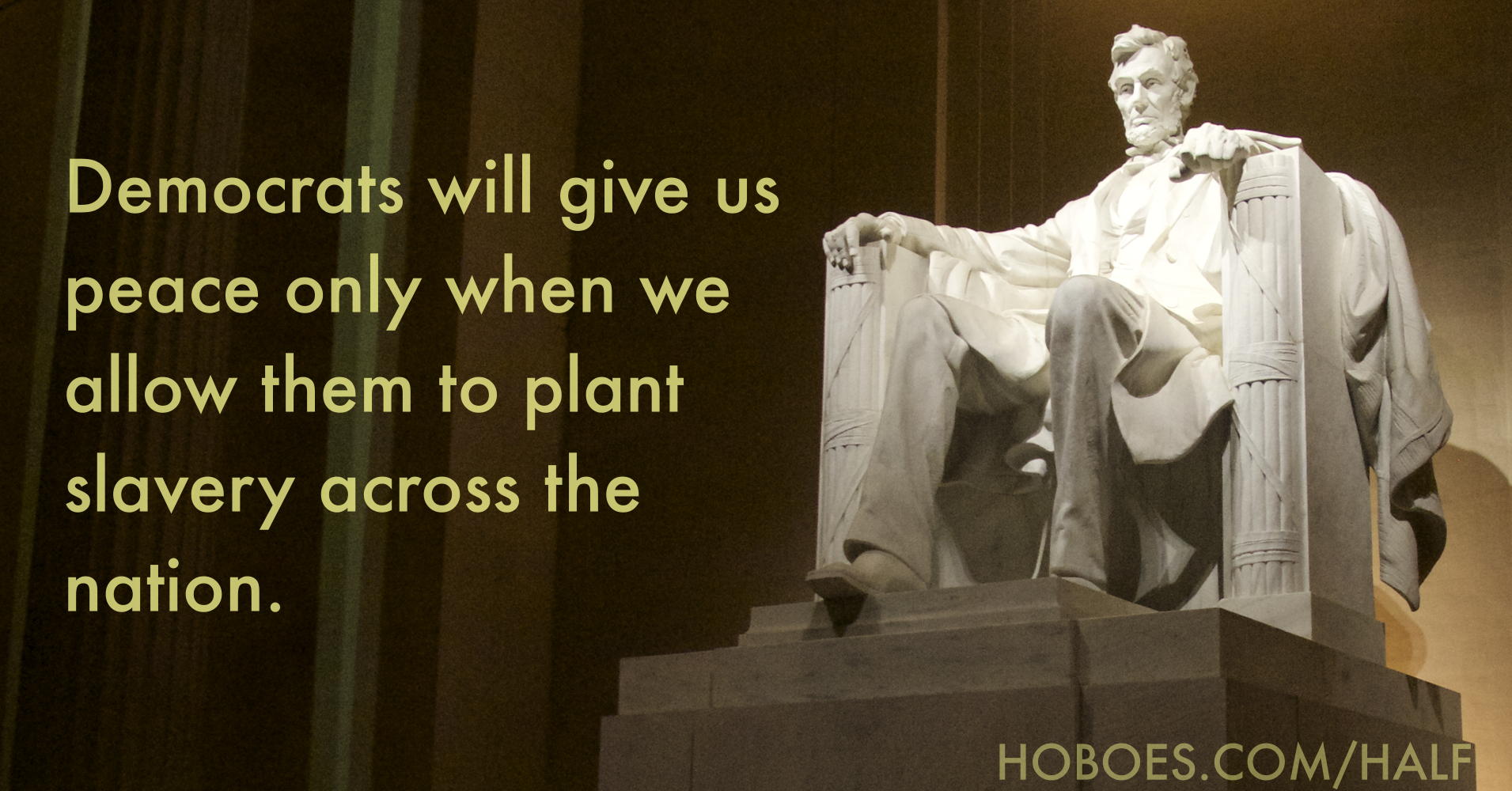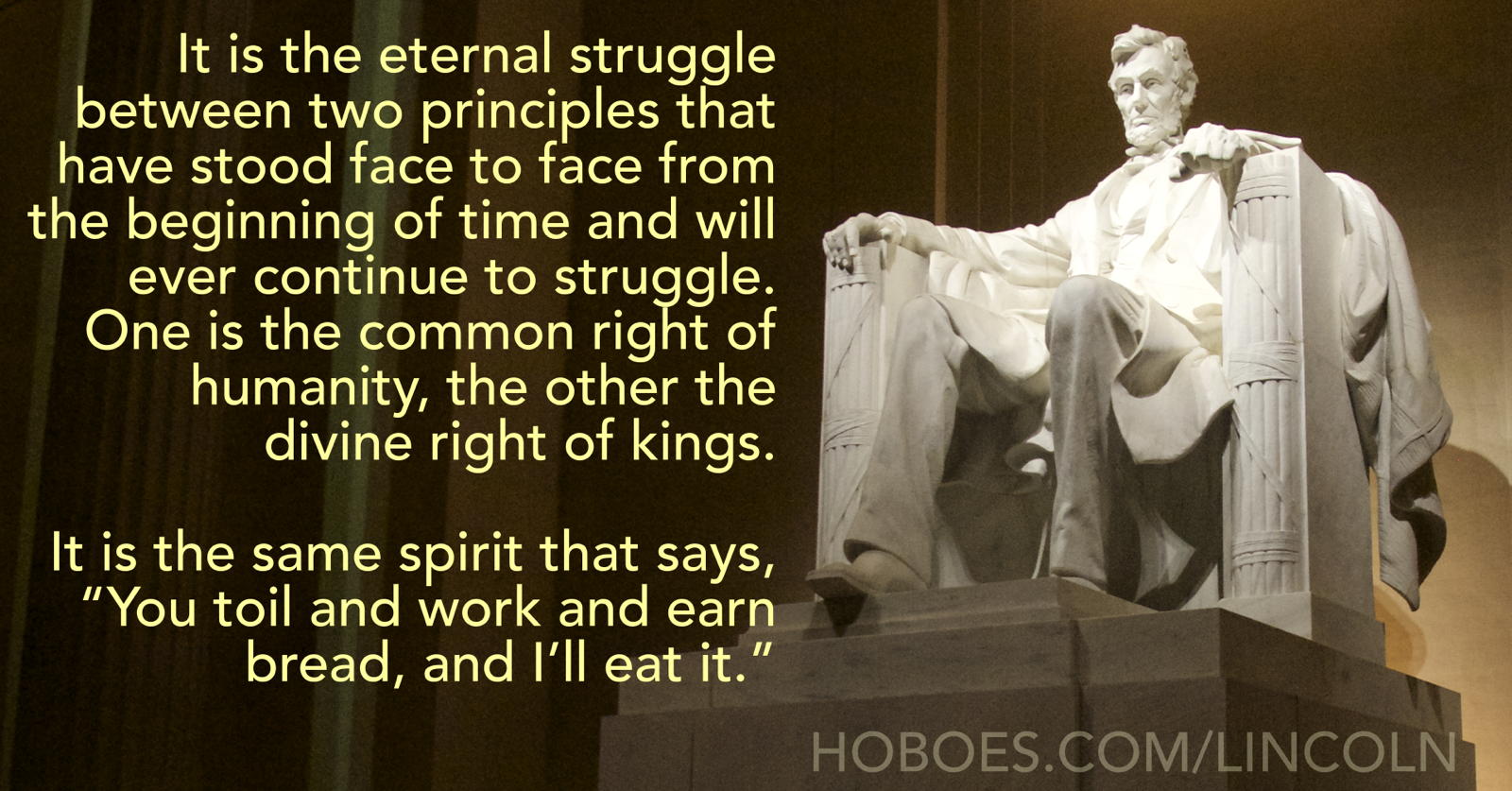Reagan’s Lincolnian Revolution

I saw this meme about the good old days show up in my Facebook feed yesterday from a friend of mine in a teacher’s union:
This is actually the 1956 Republican Party platform:
- Provide federal assistance to low-income communities
- expand social security
- Provide asylum for refugees
- Strengthen labor laws so workers can more easily join a union
- Extend minimum wage
There are several problems with this list, the obvious being that Republicans are the only party in 2019 that still wants to provide asylum for refugees. Democrats want to let in the people that immigrants need refuge from. Democrats are specifically shielding murderers, rapists, and other violent criminals from deportation, if those criminals came here illegally.
Without walls, there is no sanctuary. The Republican Party understands this. Democrats also understand it: asylum isn’t their goal. They want refugees to remain frightened and dependent.
The wider problem, though, is not that it’s wrong about what the Republican Party supported in the era of Jim Crow. What’s wrong is that Democrats still support going back to the era of Jim Crow. In 1956, wages had risen enough that the minimum wage no longer kept unskilled blacks out of the job market, no longer blocked them from gaining the skills they needed to thrive. It was only with Johnson’s Great Society that blacks stopped advancing economically.
As economist Thomas Sowell has shown in books such as Basic Economics, increasing the minimum wage hurts minorities most. Politicians in 1956 knew this. That’s why they supported increasing the minimum wage. They supported it as a form of segregation. Democrats in 2019 still know this. They still, sixty years on, want to keep unskilled blacks frightened and dependent.
Mandatory company-wide union membership is a legacy of this time. Imagine if the first time your community voted in an election, everyone in your community was automatically enrolled in whatever party won, and from then on could only be represented by that party. And everyone who later moves into your community is required to support that party or not move in! It’s a nutty system, one guaranteed to create labor unions that represent bureaucracy instead of workers.1
I’ve read several biographies about people from the fifties, such as A.M. Sperber’s bio of Edward R. Murrow. The beltway class in both parties thought that the Soviet Union was the future. Some claimed to dislike that future, but they still believed that government-run bureaucratic economies were going to bury countries that allowed free choice by consumers and workers.
It wasn’t until Reagan that the Republican Party returned to the roots planted by Abraham Lincoln. Like Lincoln, Reagan believed not just that individual freedom was preferable, but that it was superior. He praised the virtues of an economy controlled by the rights of people to buy or not buy what they wanted, to work on their own terms, instead of an economy controlled by mandatory bureaucracies. Whether those bureaucracies were directly part of the government or whether they were government-sponsored enterprises such as unions or AT&T.
Even now many Republican party leaders still prefer bureaucratic solutions to freedom. Witness their inability to break up the huge insurance and medical conglomerates by repealing the Unaffordable Care Act. They’re afraid that if they make health care safe for smaller practices and individual doctors, health care will get worse and more expensive, and they’ll lose their next election. They honestly believe that huge bureaucracies provide better service than individual doctors in business for themselves, than small practices that must compete for our money.
In 1956 it was even worse. People forget just how far left Nixon, the last elected Republican president before Reagan, was compared to even the most leftist Republicans today. Nixon joined with Democrats to enact government control of prices and wages. The results were predictable by Lincoln’s standards: stagnant wages and high prices.
They forget how hard Nixon fought to protect the beltway. The Pentagon Papers exposed only the bad policies, incompetence, and corruption of his predecessors, mainly of President Lyndon Johnson, a Democrat. But it also made bureaucratic government look bad, so Nixon fought hard to keep newspapers from printing it.
Reagan’s revolution was about providing voters with an alternative to the bureaucratic state, an alternative that the beltway ridiculed. When Reagan ended oil price controls, the left/media predicted unaffordable gasoline; of course, prices fell immediately to become more affordable. Lincoln, also, would have predicted this.
Now, I’m not claiming that Republicans from the fifties and sixties were communists. They claimed to be very saddened that communism was so obviously the wave of the future, and that the Soviet Union would outlast the United States as an economic power. They preferred freedom, but believed it inferior to bureaucracy. Reagan was cast very much in the mold of the kid observing that the anointed wore no clothes, that the basic assumptions of the beltway were completely opposite reality.
One of the clear markers of Reagan’s utter stupidity were his repeated claims that the Soviet Union was near collapse. I read this both in James Deakin’s 1984 autobiography about his time in the White House Press Corps, and in Lawrence Weschler’s book about Solidarity in Poland. Of course, as we now know, the Soviet Union was near collapse; its collapse was seven years from Deakin’s book and ten from Weschler’s.
Weschler’s equivocation about freedom is particularly egregious because he had an upfront view of the Soviet bureaucracy’s inability to meet basic food and heating needs. Despite the evidence in front of his eyes, a viewpoint few Americans had, he completely ridiculed both Reagan’s prediction that the Soviet Union was near collapse, and Solidarity’s idea that Soviet satellites could and would break from Russia.
That complete blindness to the obvious lessons of history is what the 1956 Republican platform, and the 2020 Democrat platform, represents. If I were being completely partisan, I could note that the Republicans have learned since 1956 that freedom works, while the Democrats have doubled down on slavery. But that’s not entirely true. There are still many beltway Republicans who prefer bureaucracy to freedom. There are still many Republicans who join with Democrats in pushing a bureaucratic state. It is the nature of politicians to seek power. But since Reagan there are also many Republicans who support individual freedom.
It is our responsibility to choose wisely among them, and to reject the beltway class that still claims our interests are best served by mandatory bureaucracies, that we are “voting against our interest” when we vote for individual freedom. Individual freedom is always superior to socialism. Socialism is barbaric. It is natural to attack whoever has what we want and take their stuff. Capitalism—that is, trading for what we want instead of banding together to take it—is unnatural. Socialism is regressive. It is regressive because it is natural. It is a return to barbarism.
Capitalism is civilization. Reagan and Lincoln knew this, even if Democrats and beltway Republicans do not.
In response to The new barbarism: A return to feudalism: The progressive left seems to have no concept of what civilization is, and of what undergirds civilization.
Unions also did their part to maintain segregation and keep blacks out of the workforce. By requiring union membership to get a job, and forbidding blacks from joining, unions created a Catch-22 that kept blacks out of any business represented by unions.
↑
economics
- Basic Economics: A Citizen’s Guide to the Economy
- Economics is an important topic, because unlike every other complex field, “from botany to brain surgery”, we cannot avoid taking part: while we can, and usually should, refuse to perform brain surgery, we should not refuse to vote for politicians (and, in some states, initiatives) that have wide-ranging economic effects.
- Economic misterminology: recessions that never end
- When we remove causes and effects from our descriptions of economic events, such as recessions, we lose our ability to change for the better.
- Murrow: His Life and Times
- Edward R. Murrow inspired generations of journalists with his reports from the London blitz on radio and, later, his reports on McCarthyism on television.
Ronald Reagan
- Abraham Lincoln’s conservative principles
- Reading Lincoln, it seems that both conservative thought and anti-conservative thought really hasn’t changed much in a century and a half. Though less racist for his time, he was still racist. But his adherence to conservative principles enabled him to overcome his prejudices while his contemporaries who were not conservative sank deeper into racism.
- Natural monopolies: a 20-minute call for $8.83
- “A 20-minute call anywhere in the country will cost me only $3.33? What’s the catch?” The catch is that those are still outrageous monopolistic prices.
- Review: Straight Stuff: The Reporters, the White House, and the Truth: Jerry Stratton at Jerry@Goodreads
- Deakin was very good at not seeing things that disagreed with him. He cherry-picked his examples, contradicted himself repeatedly depending on the point he wanted to make, shifts his arguments, and blindly assumes that what he wants to see is what he sees.
- Review: The passion of Poland: from Solidarity through the state of war: Jerry Stratton at Jerry@Goodreads
- This is a fascinating topic, and it appears that Weschler is very informed; the main problem is that every time he attempts to contrast Poland with the United States, he clearly doesn’t know what he’s talking about. Should I succumb to Gell-Mann amnesia and trust the parts that I know nothing about? But while the analysis seems to be lacking in just about every respect, the observations are amazing.
sanctuary cities
- 'I thought I was going to die,' woman blames prosecutors after rapist attacks her: Jennifer Sullivan
- “It’s such a broken system,” she said. “It’s definitely really politically charged. This case is being used as the ‘see we told you’ on both sides of the fence and it’s really pretty simple, he is eligible for deportation.”
- ICE Releases List Of Murderers And Rapists Protected Under Sanctuary City Policies: Jason Hopkins at The Daily Caller
- “Immigration and Customs Enforcement (ICE) released a list of criminal illegal aliens who were released from jail due to sanctuary city policies, many of whom went on to commit other crimes.”
- There is no sanctuary without walls
- Sanctuary isn’t sanctuary if you let everyone in. If we don’t have borders, we cannot provide sanctuary. The left’s definition of sanctuary means denying sanctuary for people who need refuge. Letting in both the people escaping violence and the people causing violence is to deny refuge to refugees. There is no sanctuary without walls to protect it.
More free market
- Capitalism is not an ism
- Capitalism is not a system—it’s just what people do when they get together peacefully. When people complain about capitalism, they’re really saying that they want more power over what people do when they get together peacefully.
- TXU bets against deregulation and loses
- TXU was once the government-sponsored monopoly energy provider in Texas. They just went bankrupt, apparently because they expected a free market to act like a government market.
- The precarious value of middlemen
- In a world of choice, a middleman must add value (lower prices, ease of delivery) in addition to their added costs (fewer choices, lower quality, etc.) But the costs are always there. Once a middleman is mandated, there is no longer any need to add value.
- Trying the market, or “No, you are.”
- I think I’ve figured it out. When people say they’ve tried the market and found it wanting, they’re really just trying to deflect criticism of government policies. They’re trying to pretend that the problems government causes are someone else’s fault—in this case, the free market.
- Exchanging the market for high prices and corruption
- The Democratic health insurance exchange looks like it’s going to make many of the same mistakes politicians made in California when they tried to choke electrical power through a power exchange.
More memes
- The Jurassic Park shutdown
- You know what else was opened before it was ready?
- The eye of the insulter
- The left has become so unhinged that they’re sending out promo photos for President Trump, thinking they’re insulting him. They seem to have a pathological inability to appreciate working, and don’t recognize a serious working photo when they see one.
- Slavery does not create wealth
- Frederick Douglass was born in slavery and escaped it. He tells us that slavery by its very nature destroys rather than creates wealth. That it creates a poverty not just of mind and spirit, but of the pocketbook as well.
- Left believes atheists are wasteful bullies?
- The left is touting a new study that claims to show that those without religious upbringing are more likely to sympathize with victimizers than with victims, and are more wasteful with other people’s resources.
- Red Light Cameras and rock-throwing children
- When the left sees a kid throwing a rock at other kids, they see an opportunity: to stop budding geologists from collecting rocks.
- Nine more pages with the topic memes, and other related pages
More New Barbarism
- Innovation in a state of fear: the unintended? consequences of political correctness
- Is political correctness poised to literally kill minorities as it may already have killed women, because scientists avoid critical research in order to avoid social media mobs?
- Barbarism and the Global Village
- If we don’t protect our borders, we don’t protect our civilization. When Rome let the barbarians in, they became barbarians.
- Money Changes Everything: Empowering the vicious
- Barbarism empowers the rich, the powerful, the vicious, the strong. Civilization empowers everyone else. Gun control and centralized economies, darlings of the progressive left, have empowered the vicious since the beginning of time. The beltway crowd prefers no competition from people free to barter, or free to defend themselves.
- The new barbarism: A return to feudalism
- The progressive left seems to have no concept of what civilization is, and of what undergirds civilization.
- Science by consensus is barbarism
- The scientific method is pure, distilled civilization. It is completely unnatural.
- 16 more pages with the topic New Barbarism, and other related pages
More socialism
- Science fiction’s anti-socialist socialists
- Why do socialist authors so often disparage socialism? From The Time Machine to Animal Farm, the best socialist dystopias are written by committed socialists.
- COVID Lessons: Don’t trust socialists
- Our response made the virus worse. We trusted self-styled experts, failed models, socialists, and the media over what we could see with our own eyes.
- The Pledge of Allegiance, Francis Bellamy, and national socialism
- Does it matter that the Pledge of Allegiance was written by a socialist?
- Does Hurricane Harvey support socialism in Texas?
- Should Texas forego federal assistance because Texans dislike socialism?
- Sanders complains: world has too much food
- Due to global warming, rampant capitalism, the world has too much food and too many people. Overweight outnumber underweight for first time since God talked to Moses. Presidential candidate Bernie Sanders calls for institution of Soviet food lines.
- Five more pages with the topic socialism, and other related pages



